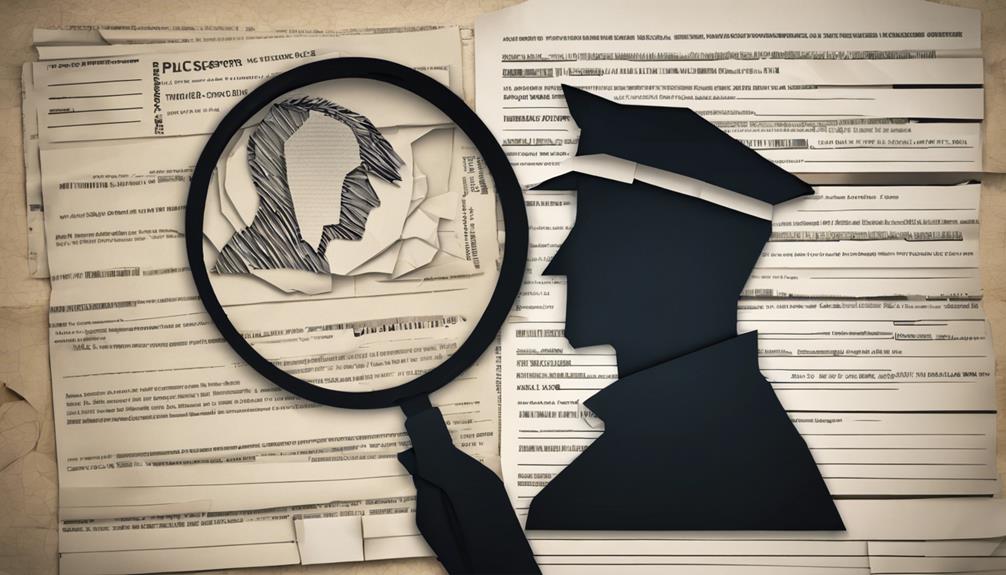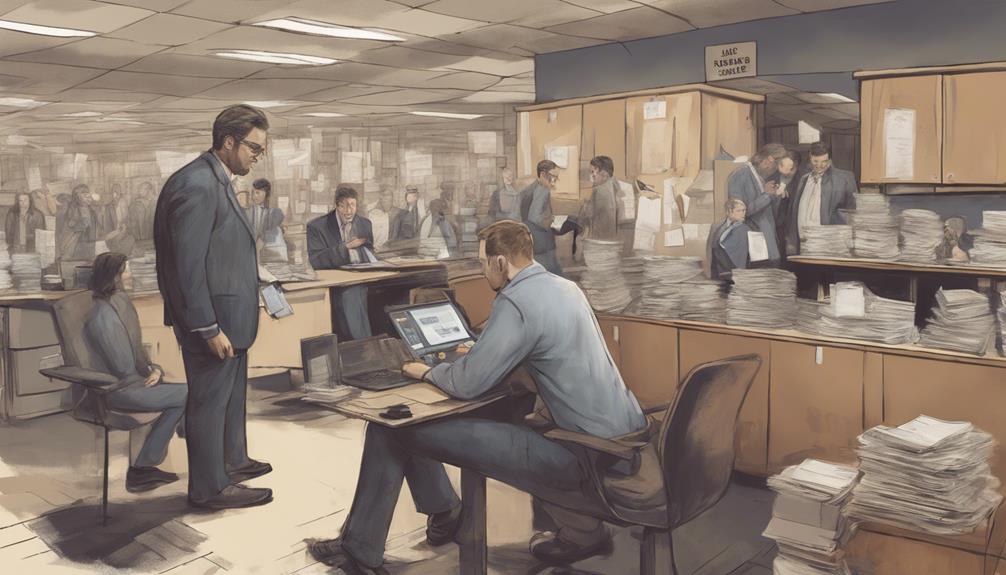Sealed records, also known as expunged records, do not appear on standard background checks, ensuring privacy for individuals. These records are effectively erased by law, making them invisible in most background screenings. A significant aspect to note is that online databases might still hold onto this information. In some cases, specific entities like government agencies or courts can access sealed records. Understanding how sealed records operate can be fundamental in various legal and professional contexts. If you want to dive deeper into the complexities and implications of sealed records, there is more to explore beyond what meets the eye.
Key Takeaways
- Sealed records are typically excluded from standard background checks to protect privacy.
- Limited access to sealed records is granted to specific entities like government agencies or law enforcement.
- Employers and landlords cannot view sealed records during routine background checks.
- Court orders may be required for accessing sealed records in certain situations.
- Individuals can verify the status of their sealed records through proper legal procedures.
Sealed Records and Background Checks
Sealed records are typically excluded from standard background checks conducted by employers or landlords, ensuring restricted access to certain government agencies or by court order in limited circumstances. These records, also known as expunged records, are kept confidential to protect individuals who've had their criminal records sealed. When a record is expunged, it's fundamentally treated as if it never existed in the eyes of the law.
If someone wants to have a record expunged, they often seek the assistance of a criminal defense attorney who specializes in such matters. Once a record is expunged, it's no longer considered a public record and shouldn't appear on most background checks.
However, it's essential to note that while sealed records may not show up on standard background checks, some online databases or websites might still retain information about past arrests or convictions. Therefore, individuals should remain vigilant about protecting their privacy and ensuring the accuracy of their personal information.
Accessing Sealed Records

To guarantee individuals' privacy and safeguard sensitive information, access to sealed records is typically restricted to certain government agencies, law enforcement, and courts, rather than being available to the general public or employers.
These sealed records aren't usually visible on standard background checks. However, in limited situations, such as for specific job positions or security clearances, access to sealed records may be granted.
While employers and the general public are generally unable to view sealed records, certain entities with a legitimate need, like government agencies and law enforcement, may have the authority to access them.
Individuals may also have the option to request access to their own sealed records under certain circumstances. The availability of sealed records for viewing is tightly controlled to protect individuals' privacy and ensure that sensitive information is only disclosed in appropriate situations.
If you believe you have sealed records and need to access them, it's advisable to follow the proper legal procedures to request access through the relevant authorities.
Impact on Public Background Checks
Restrictions on access to sealed records have a notable impact on public background checks, particularly concerning the visibility of certain individuals' past offenses.
When conducting background checks, a typical background check company won't have access to sealed criminal records. This means that for individuals who've had their records expunged or sealed by the court, their past offenses won't show up on public background checks. Employers and landlords, who often rely on these checks for screening purposes, shouldn't be able to view sealed records during their standard procedures.
Additionally, the general public using online background check platforms won't be able to see sealed records. This level of privacy protection ensures that individuals with sealed records can have peace of mind knowing that their past offenses aren't readily visible to the majority of entities conducting background checks.
Entities With Access to Sealed Records

Government agencies, including law enforcement, are among the entities that may have access to sealed records for background checks.
While certain private companies may also be granted limited access to sealed records, this access is typically restricted and subject to specific legal requirements.
Understanding which entities can view sealed records is important for individuals managing background check processes.
Accessible Government Agencies
Certain government agencies, including law enforcement and licensing boards, have the authority to access sealed records for specific purposes. These entities play an important role in conducting thorough background checks and investigations.
Access to sealed records by government agencies is typically granted for specific purposes, ensuring transparency and security in various official matters.
Here are some key points to keep in mind:
- Sealed records may still be accessible: Specific government agencies such as law enforcement, courts, or prosecutors may have the legal right to view sealed records.
- Authorized access: Certain licensing boards, public employers, and security clearance agencies may also be granted access to sealed records for official purposes.
- For specific purposes: Access to sealed records is typically allowed for background checks, investigations, court proceedings, or job applications requiring a higher level of scrutiny.
- Government entities with legal authority: While sealed from public view, government agencies with the necessary legal authority can request access to sealed records for their official duties.
Limited Law Enforcement Access
Law enforcement agencies possess access to sealed records for specific investigative or law enforcement purposes. While sealed records are generally not visible to the public, police departments, prosecutors, and courts may access them in certain situations.
Limited entities, such as the FBI background check processes, may also uncover sealed records for specific investigative purposes. These records can be accessed by authorized government agencies to aid in legal proceedings or criminal investigations.
Understanding the limited law enforcement access to sealed records is essential for individuals seeking protection and privacy.
Restricted Private Companies
Private background check companies may also be granted access to sealed records through specific legal channels, expanding the entities with potential visibility into such confidential information.
When it comes to restricted private companies with access to sealed records, individuals should be aware of the following:
- Legal Access: Private background check companies can access sealed records legally.
- Confidential Information: These companies may have visibility into otherwise private details.
- Specific Procedures: Access to sealed records by private entities is regulated by specific procedures.
- Court Oversight: The court or judiciary typically oversees the process of granting access to sealed records.
Understanding who can access sealed records is important for individuals facing various applications or situations where such information may be relevant.
Implications for Specific Situations

Access to sealed records can have significant implications in various professional contexts. Court proceedings or law enforcement investigations may lead to the disclosure of sealed records, especially in cases where the information is deemed relevant to the legal matter at hand. Certain government agencies or employers requiring security clearances may also have access to sealed records during background checks. Exceptions exist where sealed records can be legally accessed, which individuals should be mindful of to comprehend the potential implications.
In sensitive industries such as healthcare or finance, employers may request access to sealed records as part of their thorough screening processes. This heightened level of scrutiny aims to guarantee the safety and security of vulnerable populations or sensitive financial information. Understanding the implications of sealed records in these specific situations is crucial for individuals seeking employment in these sectors or applying for roles that involve handling confidential information.
Legal Guidance for Sealed Records

Understanding the legal landscape surrounding sealed records involves comprehending the potential access points and limitations imposed on requesting parties. When dealing with sealed or expunged records, individuals may seek legal guidance to navigate the complexities effectively.
Here are some key points to take into account:
- Types of Offenses: The nature of the offense that led to the sealing of records can impact the accessibility of such information.
- Court Order Requirement: Accessing sealed records often necessitates obtaining a court order, ensuring that privacy is maintained.
- Involvement of a Defense Attorney: A criminal defense lawyer can help individuals understand their rights and options when dealing with sealed records.
- Verification Possibility: Individuals can request verification of sealed records through appropriate channels to confirm if the record is still sealed.
Navigating the legal nuances of sealed records may require professional assistance, and consulting with a defense attorney can provide clarity and guidance in such matters.
Navigating Background Check Complexities

When maneuvering the complexities of background checks, individuals may encounter various factors that influence the visibility of sealed records. Sealed records, typically not included in standard background checks, offer a level of privacy and protection for individuals with such records. However, certain entities like government agencies, law enforcement, or specific licensing bodies may still access sealed records for their background checks. In such cases, court orders or special circumstances are often necessary to obtain access to sealed records, limiting their visibility to a select few. Individuals seeking to review or verify the contents of their sealed records can make formal requests in specific situations.
These records are usually not readily available online or in public databases, contributing to enhanced privacy measures. Understanding the nuances of accessing sealed records can help individuals navigate the complexities of background checks and ensure their information is handled appropriately.
Frequently Asked Questions
What Does Sealed Mean on a Background Check?
Sealed records on a background check refer to information that is not visible to the general public or most employers. Certain government agencies may still access sealed records, but they are typically not included in standard background checks.
Will a Sealed Record Show up on a Background Check in Texas?
When it comes to background checks in Texas, sealed records generally remain hidden from view. Although accessible to certain authorities, sealed records typically do not surface for employers or the public, offering individuals a degree of privacy.
Will Your Records Show on Background Check if You Have Them Sealed in California?
In California, sealed records may not typically appear on background checks for the general public. However, certain entities like government agencies, law enforcement, and specific employers could potentially access sealed records in specific situations.
Do Sealed Records Show on Fbi?
When it comes to FBI background checks, sealed records could potentially surface. While not always visible on standard checks, the FBI may have the authority to reveal sealed information for specific investigative or security purposes.
How Do Sealed Records and Adjudication Withheld Affect Background Checks?
When it comes to background checks, adjudication withheld can have a significant impact. Sealed records and adjudication withheld background checks may show up differently depending on the jurisdiction and the specific policies of the organization conducting the background check. It’s important to understand the potential implications of these legal terms on the result of a background check.
Conclusion
To sum up, while sealed records may not always show up on standard background checks, there are exceptions depending on the situation and who's conducting the check. It's important to understand the complexities involved and seek legal guidance if needed.
By staying informed and prepared, individuals can navigate background check processes with confidence and clarity. Remember, knowledge is power when it comes to managing your personal information.









